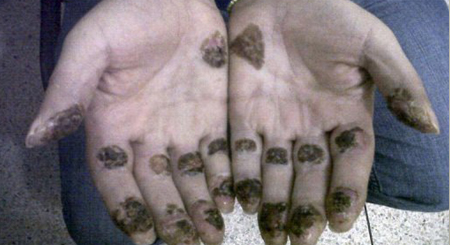For years Daniel ‘El Loco’ Barrera was the most wanted criminal in South America, accused of shipping some 900 tons of cocaine to the United States and Europe and dealing with both leftist guerrillas and right-wing paramilitary fighters.
Barrera was arrested in the the Venezuelan border town of San Cristobal while making a telephone call from a pay booth Tuesday in an operation that Colombian police chief Jose Roberto Leon Riano directed from Washington.
“‘El Loco’ Barrera was the last capo of his category, one who had major control over an important area of the country,” Christian Voelkel with the Internacional Crisis Group told AFP.
Over the past two decades Colombian police brought down the Medellin drug cartel, Pablo Escobar’s syndicate, the Cali cartel, and the gang run by the Rodriguez Orejuela brothers. Authorities also swept up the lieutenants who stepped in to lead those groups.
Barrera, who was active in eastern Colombia, ran a network that specialized in smuggling cocaine into Venezuela and then shipping it to the United States via Central America, or to Europe via Africa.
“The last of the great capos has fallen,” Colombian President Juan Manuel Santos said on nationa television, adding that the US Central Intelligence Agency (CIA) and Britain’s MI6 intelligence service provided support in the arrest.
Venezuelan Interior Minister Tareck El Aissami called Barrera’s arrest a “major coup” for his country.
For all his influence Barrera was not nearly as power as, for example, Mexican drug lord Joaquin ‘El Chapo’ Guzman, head of the Sinaloa crime syndicate.
In fact, Mexican crime groups may attempt to take over Barrera’s smuggling routes, said Ariel Avila, a specialist on the regional drug trade.
“In the coming months there will be a fight over control of that route. There are several groups that could engage in that fight,” said Avila, author of a book on the Colombia-Venezuela border.
“The Mexicans could send their people, but (the Colombian gang of) Los Urabenos or some mid-level Barrera leader could also enter the fight,” he said. Another Colombian gang, Los Rastrojos, could also enter the fray.
Barrera’s group rarely got involved in violent clashes with police or rivals because his cocaine processing labs and transport routes were protected by a criminal group made up of former right-wing paramilitary fighters, according observers.
Barrera was also generous handing out bribes in both Colombia and Venezuela, and had business ties with the Revolutionary Armed Forces of Colombia (FARC), the country’s largest guerrilla group.
The leftist rebels provided Barrera with coca leaves — the source plant of cocaine — harvested in guerrilla-controlled territory, Voelkel said.
It’s unclear if any single crime group has the infrastructure to take over Barrera’s cocaine production labs in the short term, or has the contacts to smuggle the drugs into the United States and Europe, according to Nuevo Arco Iris, a Colombian non-governmental organization that follows the drug trade.
Voelkel believes that Barrera’s network is likely to shatter into small pieces.
“But the problem is still there,” Voelkel said. “It is not necessarily easier to fight a fragmented crime network than a unified one.”
Over the last eight years Colombian authorities have cut down its cocaine production by nearly half, but the country is still one of the world’s largest producers, churning out some 345 tons of cocaine last year, according to United Nations figures.










































